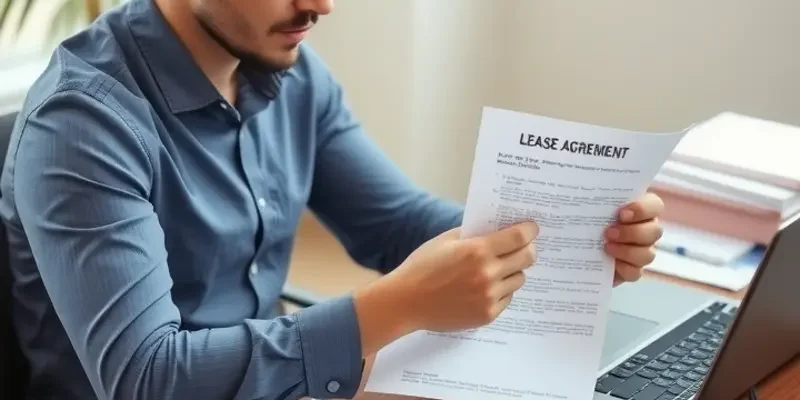Navigating apartment renewals can be daunting, especially for young professionals, first-time renters, students, couples, and families. With lease terms coming up for review, it’s essential to understand not just the lease itself but also the negotiation process. Engaging in constructive dialogue with your landlord or property manager can help you secure a better deal. Knowing your rights, being aware of market conditions, and having a strategy in place can make all the difference. This guide aims to shed light on the complexities of lease negotiations, equipping you with the tools necessary to tackle renewal discussions confidently. Whether you’re looking for a way to lower your rent, secure needed maintenance, or need clarification on lease terms, this guide will provide the clarity and confidence you need to advocate for your interests while maintaining a positive landlord relationship.
Understanding Lease Terms and Your Rights

Navigating the complexities of a lease can be daunting, but understanding your lease terms is crucial for successful negotiation during renewal. Typical lease agreements usually cover the length of the lease, rent amount, deposit requirements, and rules regarding maintenance and repairs. However, the details can significantly vary, so it’s vital to be familiar with these aspects.
Length of Lease: The standard lease length is typically 12 months, but some landlords may offer flexible terms ranging anywhere from month-to-month to 24 or even 36-month contracts. Knowing the implications of each can aid in deciding what suits your lifestyle best.
Rent and Deposits: By law, landlords must specify the rent amount, due dates, and penalties for late payments. Deposits, often equal to one month’s rent, must also be outlined, including terms for its return. Keep an eye out for fees hidden in the fine print.
Repairs and Maintenance: The lease should explicitly state the tenant’s and landlord’s responsibilities in regard to property upkeep. Understanding these terms helps avoid unexpected disagreements.
Knowing your rights not only protects you legally but also empowers you during negotiations. Tenants’ rights differ greatly by state and locality but universally cover areas such as privacy and fair treatment.
Right to Privacy: Typically, landlords must provide notice before entering the property, adhering to state-specified timeframes. Ensuring this clause is in your lease helps maintain your privacy.
Fairness and Non-Discrimination: Equal treatment is a fundamental right. Familiarize yourself with laws that protect you against discrimination based on race, gender, or familial status.
When it comes to negotiation, several elements of the lease can often be adjusted. From rent reductions to minor renovations, these negotiations are your opportunity to tailor the lease to your needs.
One negotiable aspect is the apartment-friendly cleaning schedules. Landlords may agree to modify cleaning duties or schedules if you express valid concerns. This is especially useful for those with tight schedules.
Common pitfalls in lease renewal often involve overlooking crucial details or not addressing potential issues upfront. Failing to document verbal agreements in writing can lead to complications down the line. It’s also critical to avoid rushing the decision-making process; take your time to understand each clause fully before signing.
In summary, educating yourself on these aspects of the lease renewal process can significantly enhance your ability to negotiate favorable terms. This knowledge not only protects your interests but also sets the foundation for a smoother living arrangement, ensuring a secure and accommodating home environment.
Tips for Effective Negotiation

Negotiating your apartment lease renewal can be nerve-wracking, but with careful preparation, you can turn it into an opportunity. Let’s delve into strategies that will help you effectively present your case, ensuring a favorable outcome for both you and your landlord.
The cornerstone of negotiation is understanding your position in the local market. Start by researching comparable rents in your area. Online rental platforms and local listings can provide insights into current rates for similar apartments. Focus on factors like location, square footage, amenities, and building age. Create a list of comparable properties to use as leverage in your discussions.
Communication is key when negotiating. Approach your landlord with openness and transparency. Begin the conversation early, at least two or three months before your lease expires. This timing demonstrates your proactive nature and gives both parties ample time to discuss options. Express genuine interest in staying while citing your reasons clearly, such as convenience or community attachment.
Presenting your case isn’t just about what you say but how you say it. Use “I” statements to communicate without placing blame, for example, “I noticed that rents in the area are X for similar apartments.”
Creating a win-win scenario requires you to understand the landlord’s perspective. Consider the costs they might incur with a vacant apartment, such as advertising, screening tenants, and potential lost rent. Use this knowledge to propose scenarios where both you and the landlord benefit. For instance, offering a longer lease term for a reduced rate provides stability for both parties.
To illustrate the art of negotiation, consider Sarah, a young professional in Denver. She successfully negotiated her lease renewal by presenting market research showing comparable rents 10% lower than her current rate. Her landlord agreed to a rent reduction after Sarah agreed to a minor rent increase the following year, creating predictability and savings for both sides.
In another example, Emily and Jake, recent graduates sharing an apartment, emphasized their prompt payment history and care for the property. Their landlord valued these qualities and agreed to repaint the apartment and update some appliances, enhancing Emily and Jake’s living conditions without altering their rent.
Sometimes negotiations may include additional perks rather than immediate rent reductions. It’s here creativity plays a role—consider proposing free parking, storage, or updated amenities. A request like this not only shows flexibility but also aligns with long-term benefits, saving you money indirectly.
For more tips on finding the perfect apartment and being prepared for various scenarios, you can explore our advice on apartment hunting with roommates.
Ultimately, the goal of negotiation should be to foster a positive relationship with your landlord, which can lead to smoother renewals in the future. With diligent research, effective communication, and a focus on mutual benefits, you can navigate your lease renewal with confidence.
Final words
Negotiating an apartment renewal doesn’t need to be overwhelming. With clarity about your lease terms and a well-thought-out negotiation strategy, you can advocate for yourself confidently. Remember, landlords appreciate tenants who are informed and proactive, so leveraging your knowledge can lead to a favorable outcome. Stay organized, articulate your needs clearly, and foster an open dialogue. Whether you’re aiming for a lower rent or better amenities, taking the initiative to negotiate can greatly enhance your renting experience. Equipped with these insights, you are now ready to approach your apartment renewal discussions with assurance and poise.









